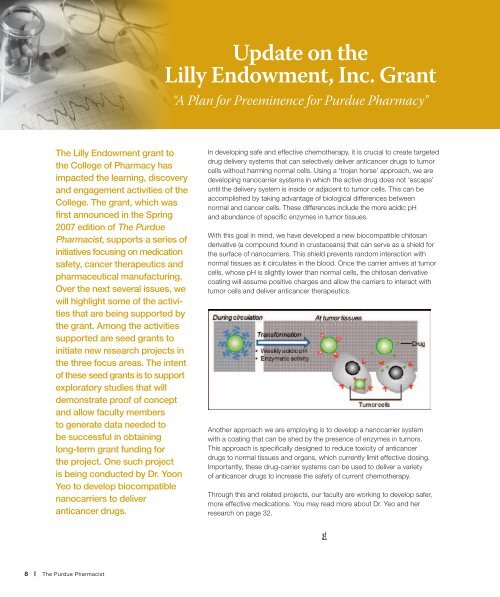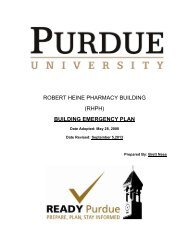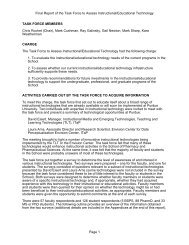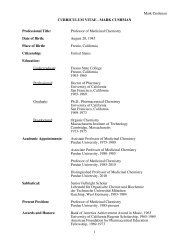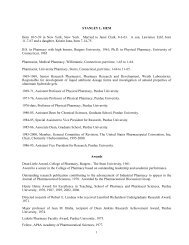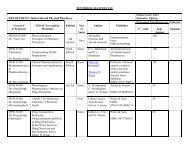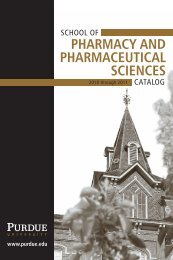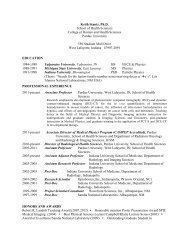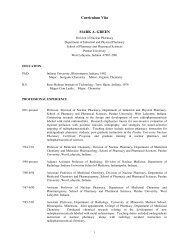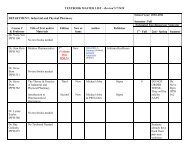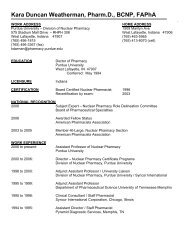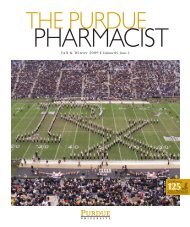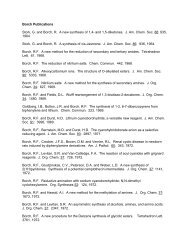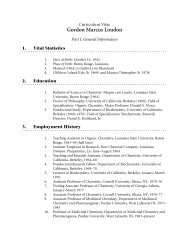Spring/Summer 2011 - Purdue College of Pharmacy - Purdue ...
Spring/Summer 2011 - Purdue College of Pharmacy - Purdue ...
Spring/Summer 2011 - Purdue College of Pharmacy - Purdue ...
You also want an ePaper? Increase the reach of your titles
YUMPU automatically turns print PDFs into web optimized ePapers that Google loves.
Update on the<br />
Lilly Endowment, Inc. Grant<br />
“A Plan for Preeminence for <strong>Purdue</strong> <strong>Pharmacy</strong>”<br />
The Lilly Endowment grant to<br />
the <strong>College</strong> <strong>of</strong> <strong>Pharmacy</strong> has<br />
impacted the learning, discovery<br />
and engagement activities <strong>of</strong> the<br />
<strong>College</strong>. The grant, which was<br />
first announced in the <strong>Spring</strong><br />
2007 edition <strong>of</strong> The <strong>Purdue</strong><br />
Pharmacist, supports a series <strong>of</strong><br />
initiatives focusing on medication<br />
safety, cancer therapeutics and<br />
pharmaceutical manufacturing.<br />
Over the next several issues, we<br />
will highlight some <strong>of</strong> the activities<br />
that are being supported by<br />
the grant. Among the activities<br />
supported are seed grants to<br />
initiate new research projects in<br />
the three focus areas. The intent<br />
<strong>of</strong> these seed grants is to support<br />
exploratory studies that will<br />
demonstrate pro<strong>of</strong> <strong>of</strong> concept<br />
and allow faculty members<br />
to generate data needed to<br />
be successful in obtaining<br />
long-term grant funding for<br />
the project. One such project<br />
is being conducted by Dr. Yoon<br />
Yeo to develop biocompatible<br />
nanocarriers to deliver<br />
anticancer drugs.<br />
In developing safe and effective chemotherapy, it is crucial to create targeted<br />
drug delivery systems that can selectively deliver anticancer drugs to tumor<br />
cells without harming normal cells. Using a ‘trojan horse’ approach, we are<br />
developing nanocarrier systems in which the active drug does not ‘escape’<br />
until the delivery system is inside or adjacent to tumor cells. This can be<br />
accomplished by taking advantage <strong>of</strong> biological differences between<br />
normal and cancer cells. These differences include the more acidic pH<br />
and abundance <strong>of</strong> specific enzymes in tumor tissues.<br />
With this goal in mind, we have developed a new biocompatible chitosan<br />
derivative (a compound found in crustaceans) that can serve as a shield for<br />
the surface <strong>of</strong> nanocarriers. This shield prevents random interaction with<br />
normal tissues as it circulates in the blood. Once the carrier arrives at tumor<br />
cells, whose pH is slightly lower than normal cells, the chitosan derivative<br />
coating will assume positive charges and allow the carriers to interact with<br />
tumor cells and deliver anticancer therapeutics.<br />
Another approach we are employing is to develop a nanocarrier system<br />
with a coating that can be shed by the presence <strong>of</strong> enzymes in tumors.<br />
This approach is specifically designed to reduce toxicity <strong>of</strong> anticancer<br />
drugs to normal tissues and organs, which currently limit effective dosing.<br />
Importantly, these drug-carrier systems can be used to deliver a variety<br />
<strong>of</strong> anticancer drugs to increase the safety <strong>of</strong> current chemotherapy.<br />
Through this and related projects, our faculty are working to develop safer,<br />
more effective medications. You may read more about Dr. Yeo and her<br />
research on page 32.<br />
8<br />
The <strong>Purdue</strong> Pharmacist


